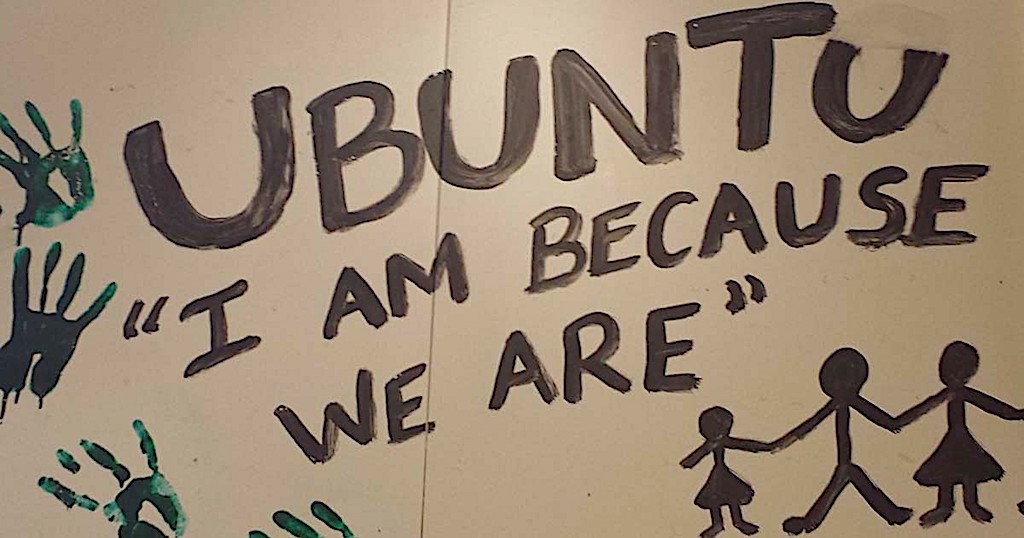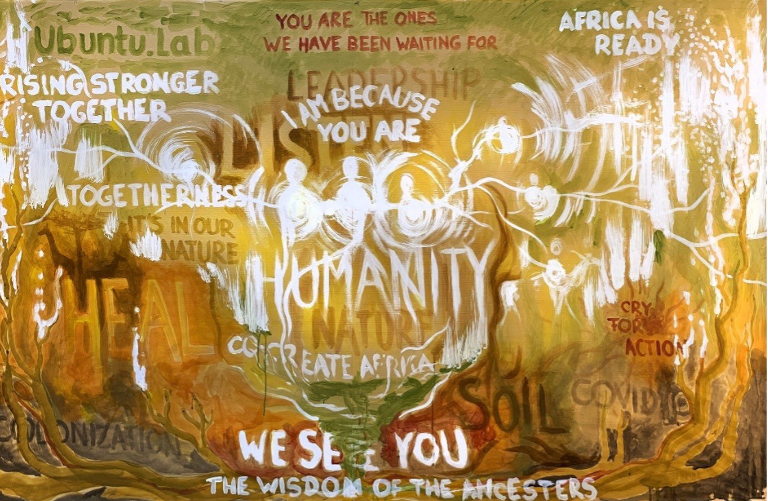

Ubuntu, a term originating from the Nguni Bantu languages of Southern Africa, carries a profound meaning that extends far beyond its association with the popular Linux-based operating system. Ubuntu is a philosophy deeply rooted in African culture, emphasizing interconnectedness, compassion, and a shared sense of humanity. In this article, we explore the various facets of and why it's important understanding Ubuntuas a philosophy, from its cultural origins to its applications in contemporary contexts.
The Essence Of Ubuntu - A Profound Interconnectedness
At the heart of Ubuntu lies a fundamental belief that transcends individualism and celebrates the interconnectedness of humanity. The expression "Umuntu ngumuntu ngabantu," serving as a succinct mantra, beautifully captures the essence of this philosophy by conveying the idea that "I am because we are."
Understanding Interconnected Worldview
Ubuntu challenges the prevailing individualistic ideologies that often dominate contemporary societies. Instead of viewing individuals as isolated entities, Ubuntu emphasizes the intrinsic connection between people. It posits that our identity is not solely defined by personal achievements or attributes but is deeply entwined with our relationships and interactions with others.
Beyond The Self
In a world often characterized by a focus on personal success and achievement, Ubuntu stands as a counterpoint, reminding us of the significance of community. The philosophy encourages individuals to look beyond their individual aspirations and consider collective well-being. Cooperation becomes a cornerstone, fostering an environment where the success of one is celebrated as the success of all.
Mutual Respect As A Guiding Principle
Ubuntu places a premium on mutual respect as a guiding principle in human interactions. It encourages individuals to recognize the inherent dignity and worth of every person, fostering an environment where differences are acknowledged and celebrated. By cultivating a mindset of respect, Ubuntu paves the way for inclusive and harmonious communities.
Cultural Roots Of Ubuntu
Ubuntu's cultural rootsdelve deep into the indigenous knowledge systems of diverse Southern African communities. It is not merely a philosophical concept but a lived experience embedded in everyday life. This cultural tapestry weaves Ubuntu into the fabric of societies, shaping traditions, values, and the very nature of interpersonal relationships.
Moral Compass In Indigenous Societies
In traditional societies, Ubuntu functions as a moral guide, guiding individuals in their behavior and decision-making. It goes beyond a mere set of rules, evolving into a lifestyle that underscores the significance of empathy, compassion, and a collective commitment to the community's well-being. For practical tips on managing emotions and fostering a harmonious mindset, explore this insightful guide on how to control your anger.
Ubuntu In Rituals And Celebrations
Ubuntu is vividly expressed in rituals and celebrations that bring communities together. Whether in communal ceremonies, storytelling, or rites of passage, Ubuntu reinforces the interconnectedness of individuals within the broader community. It is a thread that binds generations, fostering a sense of continuity and shared identity.
Ubuntu In Action
The philosophy of Ubuntu comes alive in the everyday actions of individuals within communities. It is not confined to grand gestures but finds expression in the small, meaningful interactions that collectively contribute to the well-being of the collective.
Acts Of Kindness And Generosity
Ubuntu encourages acts of kindness and generosity as individuals recognize their interconnectedness. Whether it's sharing resources, offering assistance to those in need, or simply lending a listening ear, these acts become a tangible expression of Ubuntu in action.
Conflict Resolution Through Ubuntu
In times of conflict, Ubuntu provides a framework for resolution that differs markedly from confrontational approaches. Instead of seeking retribution, the emphasis is on understanding, forgiveness, and reconciliation. Ubuntu recognizes that healing and growth are communal endeavors that require collective effort.
Unpacking The Essence Of Ubuntu
Let's embark on a profound exploration of the multifaceted concept of Ubuntu, delving into its intricacies to gain a deeper appreciation for the complexity and depthfulness encapsulated within this term. As we unravel the layers of Ubuntu, we'll discover that it extends far beyond a mere philosophical principle; it is a profound worldview that shapes how we perceive ourselves and our place in the collective tapestry of humanity.
Identity Through Relationships
Ubuntu challenges conventional notions of identity rooted solely in individual experiences. Instead, it redirects our focus toward the transformative power of relationships. It prompts us to reflect on how our existence gains meaning through shared experiences and interactions with fellow human beings. Ubuntu encourages a shift from an individualistic perspective to one that recognizes the profound impact of communal ties on shaping our identity.
Collective Living - A Shared Humanity
At its core, Ubuntu advocates for a collective understanding of humanity. It prompts individuals to perceive themselves not as isolated entities but as integral parts of a larger whole. In embracing this philosophy, Ubuntu invites us to recognize that our individual well-being is intricately linked to the well-being of the collective. It is a call to live as a shared humanity, fostering a sense of interconnectedness that transcends individual boundaries.
The Role Of Relationships In Shaping Personhood
Ubuntu's emphasis on relationships goes beyond mere social interactions; it extends to the very formation of personhood. According to this philosophy, our humanity is not a solitary construct but is molded and enriched through the quality of our relationships. How we relate to others becomes a defining aspect of our personhood, shaping our values, beliefs, and ethical perspectives.
Shifting Focus: From Individual To Collective
A distinctive feature of Ubuntu is its shift in focus from the individual to the collective. In a world often driven by personal achievements and aspirations, Ubuntu challenges us to reevaluate our perspective. It urges us to see ourselves not in isolation but as integral members of a larger community. This shift emphasizes that our humanity is deeply entwined with the well-being of others, fostering a sense of responsibility and interconnectedness.
Prioritizing Human Relationships
Within the framework of Ubuntu, the crux of humanity's essence lies in the quality of our interactions and relationships. It calls upon individuals to prioritize the ways in which we treat one another. Ubuntu suggests that the true measure of our humanity is reflected in our actions, kindness, and compassion towards others. In doing so, it highlights the significance of fostering a communal environment that values empathy and mutual respect.
Challenges Of Practicing Ubuntu
While the principles of Ubuntu may seem straightforward in theory, putting them into practice poses challenges. The dynamics of modern life, influenced by individualism and fast-paced living, can create obstacles in embracing the collective mindset Ubuntu advocates. Balancing personal aspirations with communal responsibilities requires a conscious effort to integrate Ubuntu's principlesinto our daily lives.
Evolution Of Ubuntu - Influential Advocates And Thought Leaders
The concept of Ubuntu, rooted in African humanism and emphasizing the interconnectedness of humanity, has found resonance among numerous thinkers and philosophers throughout its history. The philosophy gained widespread recognition due to its adoption by influential figures who not only embraced it but also played pivotal roles in popularizing and shaping its understanding.
African Humanism And Collective Humanity
At its core, Ubuntu draws inspiration from African humanism, asserting that the foundation of society lies in community, and our shared humanity defines us as individuals. This philosophy champions the idea that our identities are intricately woven into the fabric of collective interactions, emphasizing the significance of cooperation, empathy, and communal well-being.
Desmond Tutu - No Future Without Forgiveness
One of the key figures in popularizing the philosophy of Ubuntu is Archbishop Desmond Tutu. His book, No Future Without Forgiveness, serves as a cornerstone in the dissemination of Ubuntu's principles. Tutu's articulation of Ubuntu goes beyond a mere conceptual understanding; he describes a person with Ubuntu as someone who is "open and available to others, affirming of others, and has a proper self-assurance."
Tutu's perspective adds depth to the philosophy, portraying Ubuntu as a way of living where openness to others enriches one's humanity. It emphasizes the idea that by helping others, individuals not only contribute to the collective well-being but also enhance their own sense of self.
Nelson Mandela - Unifying Post-Apartheid South Africa
Another luminary associated with the popularization of Ubuntu is Nelson Mandela. Mandela, a central figure in the anti-apartheid movement and the first black president of South Africa, frequently spoke from the perspective of Ubuntu. His leadership during the post-apartheid era was marked by a commitment to Ubuntu's principles.
Mandela's approach to leadership was rooted in the belief that true leadership emanates from a place of peace for humanity. He applied the principles of Ubuntu by emphasizing cooperation, connection, and community building. Mandela's use of Ubuntu was instrumental in unifying a fractured nation, promoting healing, and fostering a sense of shared identity.
Legacy And Continued Impact
The influence of Desmond Tutu and Nelson Mandela in popularizing Ubuntu extends far beyond their individual efforts. Their advocacy has contributed to Ubuntu becoming a globally recognized philosophy, resonating with individuals seeking a more interconnected and compassionate world. The legacy of these influential leaders lives on as Ubuntucontinues to inspire individuals, communities, and leaders worldwide.
Navigating Challenges - Putting Ubuntu Into Practice
The principles of Ubuntu, though inherently compelling, encounter real-world challenges when translated into daily practice. The dynamics of modern life, characterized by individualism and a fast-paced lifestyle, present obstacles that require a thoughtful and intentional approach to integrate Ubuntu's principles into our daily lives.
Influence Of Individualism
One of the primary challenges in practicing Ubuntu stems from the pervasive influence of individualism. Modern societies often emphasize personal achievements, ambitions, and success, sometimes at the expense of communal well-being. The shift from an individualistic mindset to one grounded in Ubuntu's collective approach necessitates a reevaluation of personal values and priorities.
Fast-Paced Living
The rapid pace of modern life adds another layer of complexity to embracing Ubuntu. In a world driven by efficiency and instant gratification, taking the time to cultivate meaningful connections and contribute to the well-being of the community can be challenging. Balancing the demands of a hectic lifestyle with the intentional, thoughtful engagement that Ubuntu requires demands conscious effort.
Integration Of Ubuntu Principles
While understanding the theoretical aspects of Ubuntu may be straightforward, translating these principles into practical, everyday actions poses a significant challenge. The integration of Ubuntu requires conscious choices and continuous self-reflection. Individuals must actively seek opportunities to foster community, practice empathy, and contribute to the collective good.
Balancing Personal And Communal Responsibilities
Ubuntu encourages a balance between personal aspirations and communal responsibilities. Striking this equilibrium necessitates individuals to navigate the complexities of their own ambitions while remaining attuned to the needs and well-being of the broader community. This requires a conscious effort to harmonize personal growth with a commitment to the collective welfare.
Cultural And Interpretational Variances
The philosophy of Ubuntu is dynamic and can be interpreted in various ways, leading to cultural nuances and differences in its application. Understanding and respecting these variances is crucial for a harmonious practice of Ubuntu, as it ensures that the philosophy remains inclusive and adaptable across diverse communities and contexts.
Overcoming Challenges
While challenges exist, the practice of Ubuntu is not an unattainable ideal. Overcoming these obstacles requires a conscious effort on both individual and societal levels. Cultivating a sense of community, fostering open communication, and promoting a culture of mutual respect are essential steps toward overcoming the challenges posed by individualism and fast-paced living.
Understanding Ubuntu - FAQs
What Is Ubuntu And How It Works?
Ubuntu refers to both a widely used Linux-based operating system and a profound African philosophy. As an operating system, Ubuntu is part of the open-source family and is known for its user-friendly interface, stability, and security. It operates on the Linux kernel and uses the GNOME desktop environment by default. Ubuntu is maintained by Canonical Ltd. and is freely available for use, modification, and distribution. In the context of African philosophy, Ubuntu emphasizes the interconnectedness of humanity, promoting values of communal living, empathy, and shared responsibility.
What Are The 5 Principles Of Ubuntu?
The five principles of Ubuntu, as derived from the philosophy of Ubuntu, are rooted in the African humanist tradition and emphasize communal living, interconnectedness, and shared values. While there may be variations in the interpretation and expression of these principles, the following five are commonly recognized:
- Interconnectedness (Umuntu ngumuntu ngabantu):The central tenet of Ubuntu, this principle asserts that "I am because we are." It emphasizes the interconnected nature of humanity, stating that our individual well-being is inseparable from the well-being of the community. In essence, our identities are shaped and defined through our relationships with others.
- Communal Responsibility:Ubuntu promotesthe idea that individuals have a shared responsibility for the well-being of the community. It encourages active participation in community life, fostering a sense of collective responsibility for addressing challenges, supporting one another, and contributing to the greater good.
- Empathy and Compassion:Ubuntu places a strong emphasis on empathy and compassion. Individuals are encouraged to understand and share in the experiences of others, recognizing the humanity in every person. By cultivating empathy, Ubuntu seeks to create a more compassionate and understanding society.
- Respect for Others:Respect is a fundamental principle in Ubuntu. It involves recognizing and acknowledging the inherent dignity and worth of every individual. Ubuntu encourages interactions based on mutual respect, valuing diversity, and appreciating the unique contributions each person brings to the community.
- Harmony and Unity:Ubuntu envisions a harmonious and unified community where individuals work together for the greater good. This principle emphasizes the importance of cooperation, collaboration, and unity in achieving common goals. By fostering harmony, Ubuntu seeks to create a collective environment that benefits all its members.
What Is The Point Of Ubuntu?
The point of Ubuntu, both as an operating system and a philosophy, is to create a platform and mindset that emphasizes inclusivity, collaboration, and shared responsibility. In the context of the operating system, Ubuntu aims to provide a free, open-source alternative to proprietary systems, allowing users to have control over their software. As a philosophy, Ubuntu encourages individuals to recognize their interconnectedness and to live in a way that promotes the well-being of the collective. It underscores the importance of empathy, cooperation, and mutual respect in fostering harmonious communities and societies.
Conclusion
In a world marked by diversity and interconnectedness, Ubuntu offers a timeless and powerful philosophy. Whether applied in local communities or as a guiding principle for international relations, Ubuntu encourages us to recognize our shared humanity. By embracing Ubuntu, we can build bridges, foster understanding, and work together to create a more compassionate and inclusive world.




